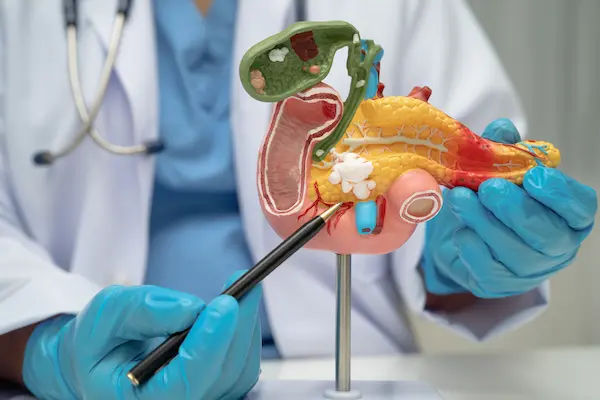Pancreatitis Symptoms, Treatment, Causes, and Diagnosis
Pancreatitis causes inflammation of the pancreas, leading to severe abdominal pain, digestive issues, and complications. Learn about its symptoms, causes, diagnosis, treatment options, and lifestyle tips for better management.

Written by Dr. Dhankecha Mayank Dineshbhai
Reviewed by Dr. Shaik Abdul Kalam MD (Physician)
Last updated on 13th Jan, 2026

Pancreatitis is a condition that affects the pancreas, an important organ responsible for digestion and blood sugar regulation. If you or a loved one is experiencing symptoms related to pancreatitis, it’s essential to understand what it is, its causes, and how it can be managed. This article will guide you through everything you need to know in simple, easy-to-understand terms.
What is Pancreatitis?
The pancreas is a gland located behind the stomach that helps digest food and regulate blood sugar by producing enzymes and hormones like insulin. Pancreatitis occurs when the pancreas becomes inflamed, causing pain and digestive issues.
There are two main types:
- Acute Pancreatitis – A sudden inflammation that lasts for a short time, often treatable with medical care.
- Chronic Pancreatitis – A long-term condition where repeated inflammation leads to permanent damage.
Symptoms of Pancreatitis
The symptoms can vary depending on whether it’s acute or chronic:
Acute Pancreatitis Symptoms:
- Severe upper abdominal pain that may radiate to the back
- Swollen or tender abdomen
- Nausea and vomiting
- Fever
- Rapid pulse
Chronic Pancreatitis Symptoms:
- Persistent abdominal pain (may worsen after eating)
- Unintended weight loss
- Oily, foul-smelling stools (due to poor digestion)
- Diabetes (if insulin-producing cells are damaged)
If you experience sudden, severe abdominal pain, seek medical help immediately, as acute pancreatitis can be life-
threatening.
What Causes Pancreatitis?
Several factors can lead to pancreatitis, including:
1. Gallstones
Gallstones can block the pancreatic duct, causing enzymes to build up and inflame the pancreas.
2. Heavy Alcohol Use
Excessive alcohol consumption over time can trigger chronic pancreatitis.
3. High Triglyceride Levels
Very high levels of fats (triglycerides) in the blood can lead to inflammation.
4. Infections, Injuries, or Medications
Certain infections, abdominal trauma, or medications may contribute to pancreatitis.
5. Genetic Factors
Some people inherit conditions that increase their risk.
How is Pancreatitis Diagnosed?
If your doctor suspects pancreatitis, they may recommend:
- Blood Tests – To check enzyme levels (amylase and lipase).
- Imaging Tests – Ultrasound, CT scan, or MRI to examine the pancreas.
- Stool Tests – To check fat absorption in chronic cases.
- Endoscopic Procedures – ERCP (Endoscopic Retrograde Cholangiopancreatography) to view ducts.
Early diagnosis helps prevent complications like infections, kidney failure, or diabetes.
Treatment Options for Pancreatitis
Treatment depends on whether it’s acute or chronic:
For Acute Pancreatitis:
- Hospitalization – For pain control and IV fluids.
- Fasting – To rest the pancreas (you may be given nutrients through an IV).
- Medications – Pain relievers and antibiotics if an infection is present.
- Surgery – If gallstones are the cause, removal may be necessary.
For Chronic Pancreatitis:
- Pain Management – Medications or nerve block procedures.
- Enzyme Supplements – To aid digestion.
- Insulin Therapy – If diabetes develops.
- Lifestyle Changes – Avoiding alcohol and fatty foods.
Lifestyle and Dietary Tips for Managing Pancreatitis
Making healthy choices can help manage symptoms and prevent flare-ups:
1. Avoid Alcohol Completely
Alcohol worsens inflammation, so it’s best to eliminate it.
2. Eat a Low-Fat Diet
- Choose lean proteins (chicken, fish, tofu).
- Opt for whole grains, fruits, and vegetables.
- Avoid fried, greasy, or processed foods.
3. Stay Hydrated
Drink plenty of water to help digestion.
4. Small, Frequent Meals
Eating smaller portions reduces stress on the pancreas.
5. Quit Smoking
Smoking increases the risk of pancreatitis and complications.
When to See a Doctor?
If you experience:
- Severe, persistent abdominal pain
- Jaundice (yellowing of skin/eyes)
- Unexplained weight loss
- Frequent nausea or vomiting
Consult a doctor immediately. Early treatment can prevent serious complications.
How Apollo 24|7 Can Help
If you suspect pancreatitis or need expert advice, Apollo 24|7 offers:
- Online consultations with gastroenterologists
- Lab tests for quick diagnosis
- Personalized treatment plans
You can easily book an appointment or schedule tests from the comfort of your home.
Final Thoughts
Pancreatitis can be painful and disruptive, but with proper care and lifestyle changes, it can be managed effectively. If
you notice symptoms, don’t ignore them—seek medical help early. By making healthy choices and following your doctor’s advice, you can protect your pancreas and overall well-being.
Consult a General Practitioner for Personalised Advice
Consult a General Practitioner for Personalised Advice

Dr. Mainak Baksi
General Practitioner
13 Years • MBBS , MD (MPH)
Howrah
Mainak Baksi Clinic, Howrah
(50+ Patients)

Dr Divya Lekha Gunta
General Practitioner
10 Years • MBBS, MD (Pathology)
Visakhapatnam
Apollo 24|7 Clinic - Andhra Pradesh, Visakhapatnam

Dr Suseela
General Physician
5 Years • MBBS
Bengaluru
Apollo Medical Center, Marathahalli, Bengaluru

Dr. Siri Nallapu
General Practitioner
5 Years • MBBS
Hyderabad
Apollo 24|7 Clinic, Hyderabad

Dr Summaiya Banu
General Practitioner
8 Years • MBBS
Hyderabad
Apollo 24|7 Clinic, Hyderabad
(250+ Patients)

